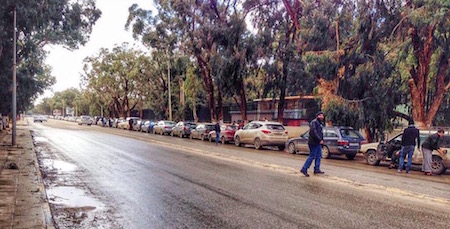Libya Herald reporter Adam Ali takes much of the day trying to fill his car with petrol in Benghazi

Benghazi , 8 . . .[restrict]January 2015:
The fighting in Benghazi has largely died down. It is not seen as a major problem anymore. The big problem now is the long electricity cuts, which means there is no water, no mobile phone service, no internet. It also means petrol pumps do not work, leading to long queues at the petrol stations, just like what happened in Tripoli just over a year ago and again last summer. And there is no bottle gas for cooking. People are having to use charcoal. But it’s shot up in price. It is the same too with candles. A box of ten used to cost three dinars; they are now 75 girsh (piasters: 750 dirhams) each.
To make things even worse, it is cold – very cold. So without electricity and gas, we can’t get warm. The fighting may be all but over, but people are getting very depressed in Benghazi.
Yesterday, I got up early to try and get some petrol. By 7am I joined an already long queue waiting at a petrol station off Dubai Street to open. We waited three hours in the cold for the station manager to turn up to open the pumps. He never appeared. He eventually sent a message saying that there was fighting and he could not come.
It meant heading to another petrol station, one in Hadaiq.
It was open but the queue was enormous and it was chaos.
Some people tried to jump the queue, leading to furious arguments. There were arguments too as others, having filled their cars, then started filling cans with petrol to sell on the black market. Six litres sell for 10 dinars – cheap by European prices perhaps, but exhorbitant in Libya where a litre is officially 15 piasters. People were shouting and screaming at those doing it.
At one point, a man tried to grab the can of a person filling it, which led to a fight. One of the security guards at the petrol station – they are not army just people brought in to try and control the situation – fired into the air to calm things. But it did not make much difference. Benghazi has become used to people firing into the air, so we ignore it now.
For more than five hours I waited, slowly edging nearer and nearer to the pumps while the chaos continued, hearing regular bursts of gunfire as the security officials tried to maintain order.
In the end, following a fresh bout of fighting between angry, frustrated customers, they gave up and shut the station. All that time had been wasted.
“It’s too much,” said one man in the queue before he drove off on his almost empty tank. “I need to go to the bank, I don’t have money. But the banks are closed and the nearest one that’s open is in Sidi Khalifa. Now I don’t have the petrol to get there. It’s just too much. We don’t have cooking gas. We don’t have electricity. We don’t have petrol. We don’t have anything.”
I went home without having filled the car. And it was so cold waiting all that time – unbearably cold.
And back home, there is no hot water. You can’t have a shower.
Despite the relief that the fighting has all but ended, it is no wonder that people are deeply depressed in Benghazi at the moment.
Jamal Adel in Beida adds:
It is not just in Benghazi that the electricity cuts are hitting everyday life . They are affecting the whole of the Cyreanaica, and to cope with it, a number of people have bought generators for home use. But there can be deadly consequences.
A family of five died of carbon monoxide poisoning from fumes given off from the generator in their house in Beida last Sunday.
It is far from the only case as ever more people install generators inside their homes to deal with the power cuts and heaters to ward off the cold. Four days earlier, a two-year old child died of carbon monoxide poisoning from fumes from a kerosene heater; two other brothers were rushed to hospital. [/restrict]







